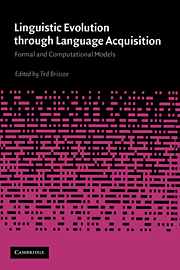Book contents
- Frontmatter
- Contents
- List of contributors
- 1 Introduction
- 2 Learned systems of arbitrary reference: The foundation of human linguistic uniqueness
- 3 Bootstrapping grounded word semantics
- 4 Linguistic structure and the evolution of words
- 5 The negotiation and acquisition of recursive grammars as a result of competition among exemplars
- 6 Learning, bottlenecks and the evolution of recursive syntax
- 7 Theories of cultural evolution and their application to language change
- 8 The learning guided evolution of natural language
- 9 Grammatical acquisition and linguistic selection
- 10 Expression/induction models of language evolution: dimensions and issues
- Index
5 - The negotiation and acquisition of recursive grammars as a result of competition among exemplars
Published online by Cambridge University Press: 23 November 2009
- Frontmatter
- Contents
- List of contributors
- 1 Introduction
- 2 Learned systems of arbitrary reference: The foundation of human linguistic uniqueness
- 3 Bootstrapping grounded word semantics
- 4 Linguistic structure and the evolution of words
- 5 The negotiation and acquisition of recursive grammars as a result of competition among exemplars
- 6 Learning, bottlenecks and the evolution of recursive syntax
- 7 Theories of cultural evolution and their application to language change
- 8 The learning guided evolution of natural language
- 9 Grammatical acquisition and linguistic selection
- 10 Expression/induction models of language evolution: dimensions and issues
- Index
Summary
Introduction
Of the known animal communication systems, human languages appear to be unique in their use of recursively characterizable structural relations among sequences of sounds or gestures and the meanings those sequences can be used to express.
The patterns of structural relations that recursion makes possible can serve a range of communicative functions, tremendously extending the expressive resources of the system. Structural relations may be used to express specific meanings, or to modify, extend, or restrict the meanings conveyed by words and other simple constituents.
Despite the unbounded complexity it makes possible, a recursive communicative system can be learned relatively easily because the constituents of a complex construction may themselves be simpler instances of that same kind of construction, and the properties of complex constructions are often predictable from simpler counterparts.
The research described in this chapter is an investigation of how recursive communication systems can come to be. In particular, the investigation explores the possibility that such a system could emerge among the members of a population as the result of a process I characterize as ‘negotiation’, in which each individual both contributes to, and conforms with, the system as it develops. The members of the population are assumed to possess general cognitive capacities sufficient for communicative behavior and for learning to modify their behavior based on observations of others. However they are given no external guidance about how their communication system is to work, and their internal cognitive mechanisms impose few constraints.
A detailed model of the cognitive capacities required to participate in the negotiation of a communication system is presented in this chapter.
- Type
- Chapter
- Information
- Linguistic Evolution through Language Acquisition , pp. 111 - 172Publisher: Cambridge University PressPrint publication year: 2002
- 35
- Cited by



